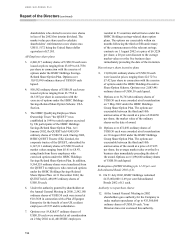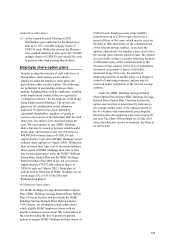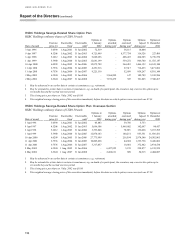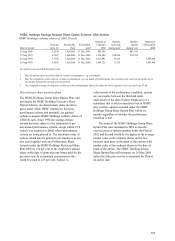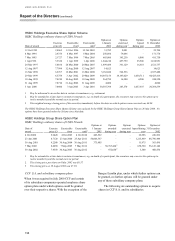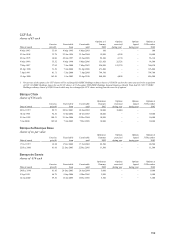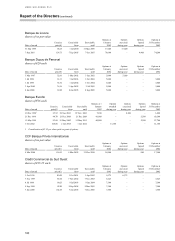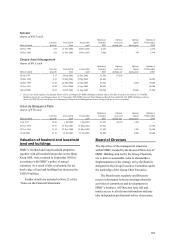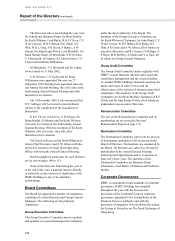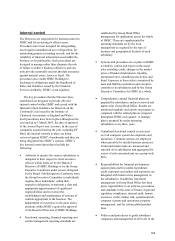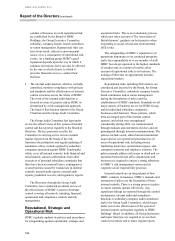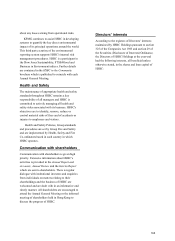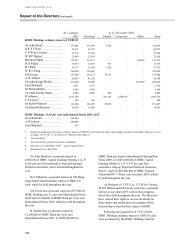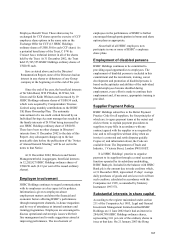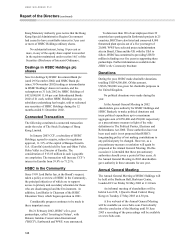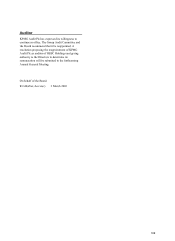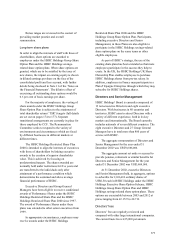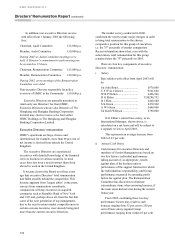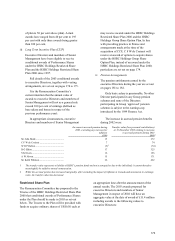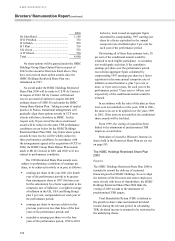HSBC 2002 Annual Report Download - page 166
Download and view the complete annual report
Please find page 166 of the 2002 HSBC annual report below. You can navigate through the pages in the report by either clicking on the pages listed below, or by using the keyword search tool below to find specific information within the annual report.
HSBC HOLDINGS PLC
Report of the Directors (continued)
164
conduct of business to avoid reputational risk
are established by the Board of HSBC
Holdings, the Group Executive Committee,
subsidiary company boards, board committees
or senior management. Reputational risks can
arise from social, ethical or environmental
issues, or as a consequence of operational risk
events. As a banking group, HSBC's good
reputation depends upon the way in which it
conducts its business but it can also be affected
by the way in which clients, to which it
provides financial services, conduct their
business.
• The internal audit function, which is centrally
controlled, monitors compliance with policies
and standards and the effectiveness of internal
control structures across the whole of HSBC.
The work of the internal audit function is
focused on areas of greatest risk to HSBC as
determined by a risk management approach.
The head of this function reports to the Group
Chairman and the Group Audit Committee.
The Group Audit Committee has kept under
review the effectiveness of this system of internal
control and has reported regularly to the Board of
Directors. The key processes used by the
Committee in carrying out its reviews include
regular reports from the heads of key risk
functions; the production and regular updating of
summaries of key controls applied by subsidiary
companies measured against HSBC benchmarks
which cover all internal controls, both financial and
non-financial; annual confirmations from chief
executives of principal subsidiary companies that
there have been no material losses, contingencies
or uncertainties caused by weaknesses in internal
controls; internal audit reports; external audit
reports; prudential reviews; and regulatory reports.
The Directors, through the Group Audit
Committee, have conducted an annual review of
the effectiveness of HSBC’ s system of internal
control covering all controls, including financial,
operational and compliance controls and risk
management.
Reputational, Strategic and
Operational Risk
HSBC regularly updates its policies and procedures
for safeguarding against reputational, strategic and
operational risks. This is an evolutionary process
which now takes account of The Association of
British Insurers’ guidance on best practice when
responding to social, ethical and environmental
(SEE) risks.
The safeguarding of HSBC’ s reputation is of
paramount importance to its continued prosperity
and is the responsibility of every member of staff.
HSBC has always operated to the highest standards
of conduct and, as a matter of routine, takes
account of reputational risks to its business. The
training of Directors on appointment includes
reputational matters.
Reputational risks, including SEE matters, are
considered and assessed by the Board, the Group
Executive Committee, subsidiary company boards,
board committees and/or senior management
during the formulation of policy and the
establishment of HSBC standards. Standards on all
major aspects of business are set for HSBC Group
and for individual subsidiary companies,
businesses and functions. These policies, which
form an integral part of the internal control
systems, and which were strengthened
considerably during 2002, are communicated
through manuals and statements of policy and are
promulgated through internal communications. The
policies include social, ethical and environmental
issues and set out operational procedures in all
areas of reputational risk, including money
laundering deterrence, environment impact, anti-
corruption measures and employee relations. The
policy manuals address risk issues in detail and co-
operation between head office departments and
businesses is required to ensure a strong adherence
to HSBC’ s risk management system and its
corporate social responsibility practices.
Internal controls are an integral part of how
HSBC conducts its business. HSBC’ s manuals and
statements of policy are the foundation of these
internal controls. There is a strong process in place
to ensure controls operate effectively. Any
significant failings are reported through the control
mechanisms, internal audit and compliance
functions to subsidiary company audit committees
and to the Group Audit Committee, which keeps
under review the effectiveness of the system of
internal controls and reports regularly to HSBC
Holdings’ Board. In addition, all Group businesses
and major functions are required to review their
control procedures and to make regular reports


